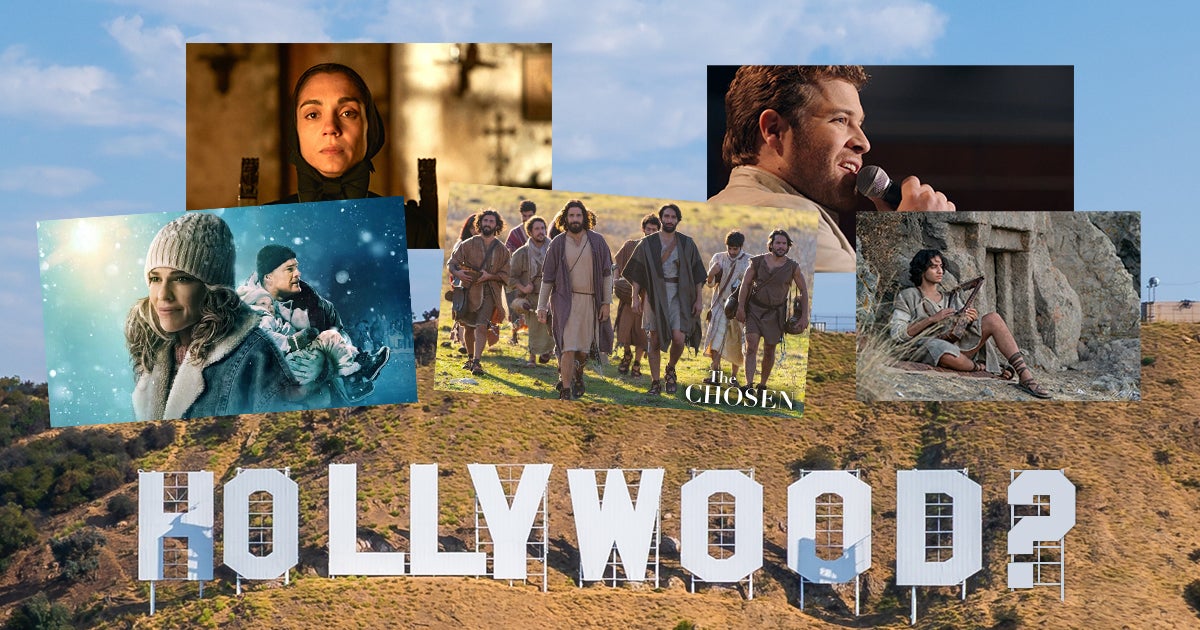
by Emma Sumlin • 3 minutes
Popular entertainment is a reflection of a society. It is a mirror of culture.
That looking glass is revealing that patriotic and faith-based films and TV shows are what people are craving. America longs for stories that ground them, rather than confuse them. They want themes that give them something to believe in.
For decades, Hollywood has been delivering a cultural narrative saturated in twisted ideology.
Stories have redefined good and evil, desensitizing audiences to violence, promiscuity and cruelty. The industry has promoted self-fulfillment and minimized self-sacrifice. Objective truth is non-existent. Films have replaced beauty with chaotic, grotesque and ironic images. The scripts worship victimhood and revenge, rather than forgiveness and reconciliation.
Modern Hollywood has also tried to confound and destroy our national identity—an identity historically defined by love of God and country.
Movies and television have highlighted immorality and sidelined faith. Religious characters are regularly portrayed as duplicitous bad guys, and churches are empty and forgotten.
But lately, that narrative is changing. Americans appear to be getting tired of “woke” content that vilifies all that makes our nation great. We’re watching faith and religious expression resurge across America, and box office results show that people are craving virtuous stories grounded in faith, family and patriotism.
“Religious movies are sweeping Hollywood,” The Wall Street Journal reports. “Christian filmmakers have surprised the world with a series of box office hits. Their success could change the entertainment industry.”
In 2004, The Passion of the Christ changed the way faith-based films were made. Director Mel Gibson set an unmatched standard for Biblical storytelling. However, though films such as Facing the Giants (2006) and Fireproof (2008) and War Room (2015) delivered box office success, Hollywood kept investing in poisonous narratives.
Then, in 2017, a crowdfunded series called The Chosen appeared on the smallest screen, and found a massive audience. People saw Jesus and the Disciples in a new light. They saw humanity and humor, Jesus’ love and compassion.
“A pathbreaking television series about the life of Jesus Christ, has become the largest crowdfunded project in history, raising over $10 million from viewers,” ET BrandEquity said.
In 2018, filmmaking brothers Jon and Andrew Erwin released I Can Only Imagine. It follows Bart Millard, the lead singer MercyMe, and relates how his troubled childhood and relationship with his father led him to write the popular song.
I Can Only Imagine grossed over $83 million domestically.
Variety commented, “Millard’s story is simultaneously relatable and optimistic. The movie works for the same reason the song does: It lightens the burden of the pain people are shouldering today, and gives them something to look forward to.”
The Erwin brothers went on to establish an independent film and television studio in partnership with Lionsgate called Kingdom Story Company. Their films have rocked the box office with successful titles including I Still Believe (2020), American Underdog (2021), Jesus Revolution (2023), Ordinary Angels (2024), Unsung Hero (2024), and many more. Their next film, I Can Only Imagine 2, is set to release in February.
“Over the past decade, Kingdom films have established a unique ability to connect with their audiences in the faith community and beyond through high-quality storytelling and exceptional productions,” said Lionsgate Motion Picture Group chair Adam Fogelson.
Something is happening. People keep showing up to watch faith-based films and shows.
While Hollywood has been bombing with sequels, reboots, remakes, spinoffs and endless mini-series, audiences are showing up for redemptive stories that affirm faith and America.
You may remember how left-leaning media criticized Top Gun: Maverick, saying it was “a two-and-a-half-hour long cinematic commercial” for military propaganda. They suggested it was a bad thing to encourage men and women to fight for our country. But, the box office spoke otherwise: $1.5 billion worldwide. People love America. America loved the movie.
So, what is the looking glass telling us?
People desire something richer, deeper and transcendent. They want objective truth. They want direction. They want hope. And hope is now mainstream.